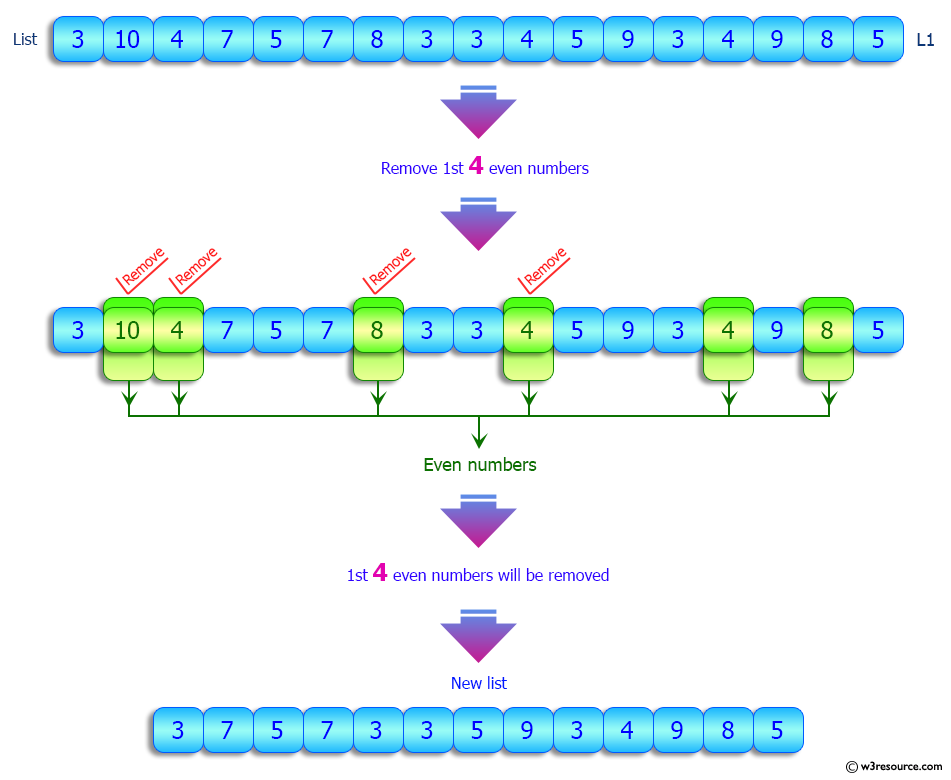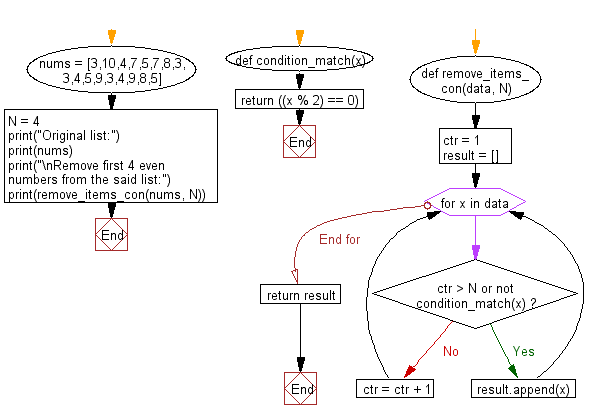Python: Remove first specified number of elements from a given list satisfying a condition
Remove Elements by Condition
Write a Python program to remove the first specified number of elements from a given list satisfying a condition.
Remove the first 4 number of even numbers from the following list:
[3,10,4,7,5,7,8,3,3,4,5,9,3,4,9,8,5]
Output:
[3, 7, 5, 7, 3, 3, 5, 9, 3, 4, 9, 8, 5]
Pictorial Presentation:

Sample Solution:
Python Code:
# Define a function called condition_match that checks if a number is even.
def condition_match(x):
return ((x % 2) == 0)
# Define a function called remove_items_con that takes a list 'data' and an integer 'N' as input.
def remove_items_con(data, N):
# Initialize a counter variable 'ctr' to 1.
ctr = 1
# Create an empty list called 'result' to store the filtered elements.
result = []
# Iterate through the elements 'x' in the 'data' list.
for x in data:
# Check if the counter 'ctr' is greater than 'N' or if 'x' does not meet the condition of being even.
if ctr > N or not condition_match(x):
# If the condition is met, add 'x' to the 'result' list.
result.append(x)
else:
# If the condition is not met, increment the counter 'ctr' by 1.
ctr = ctr + 1
# Return the 'result' list containing elements that meet the filtering criteria.
return result
# Create a list 'nums' containing integer values.
nums = [3, 10, 4, 7, 5, 7, 8, 3, 3, 4, 5, 9, 3, 4, 9, 8, 5]
# Define the integer 'N' for the filtering condition.
N = 4
# Print a message indicating the original list.
print("Original list:")
print(nums)
# Print a message indicating the purpose of the code.
print("\nRemove first 4 even numbers from the said list:")
# Call the 'remove_items_con' function to filter the list and remove the first 4 even numbers, then print the result.
print(remove_items_con(nums, N))
Sample Output:
Original list: [3, 10, 4, 7, 5, 7, 8, 3, 3, 4, 5, 9, 3, 4, 9, 8, 5] Remove first 4 even numbers from the said list: [3, 7, 5, 7, 3, 3, 5, 9, 3, 4, 9, 8, 5]
Flowchart:

For more Practice: Solve these Related Problems:
- Write a Python program to remove the first n elements from a list that satisfy a given lambda condition.
- Write a Python program to remove the first n even numbers from a list and then output the remaining list in reverse order.
- Write a Python program to remove the first n occurrences of elements that are multiples of a specified number from a list.
- Write a Python program to remove the first n elements from a list that are greater than a given threshold value.
Go to:
Previous: Write a Python program to append the same value /a list multiple times to a list/list-of-lists.
Next: Write a Python program to check if a given list is strictly increasing or not. Moreover, If removing only one element from the list results in a strictly increasing list, we still consider the list true.
Python Code Editor:
What is the difficulty level of this exercise?
Test your Programming skills with w3resource's quiz.
